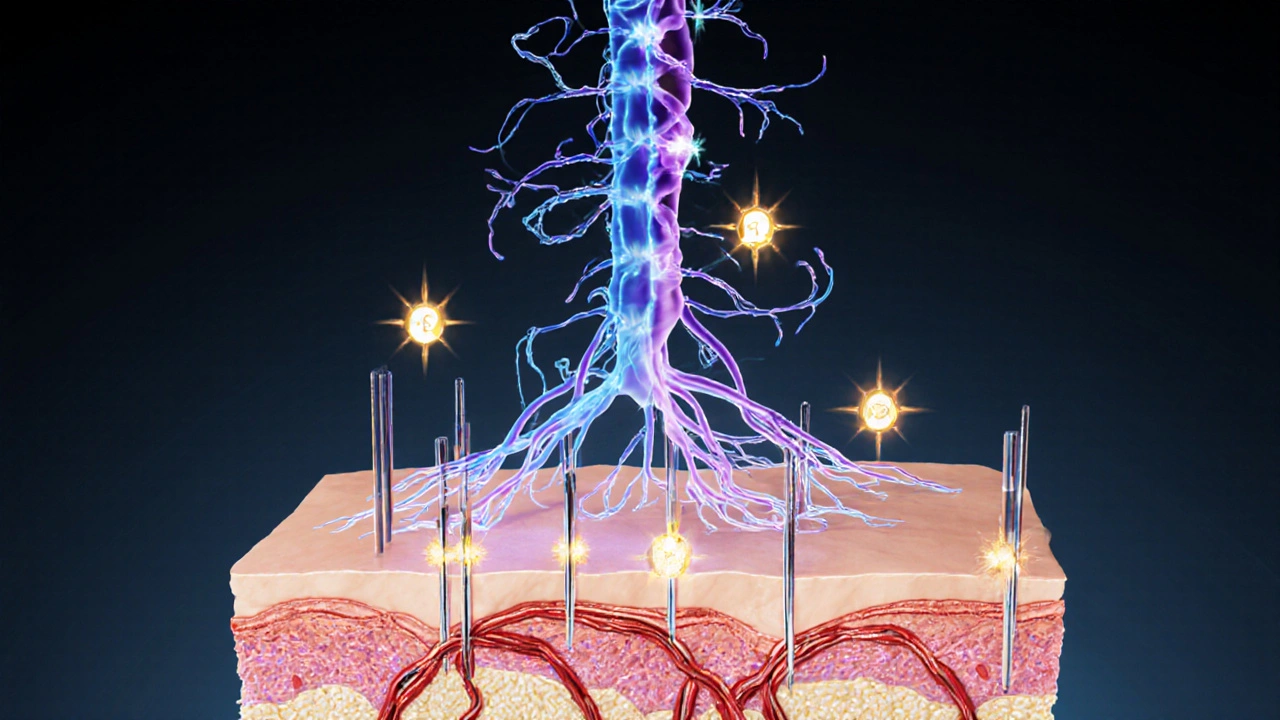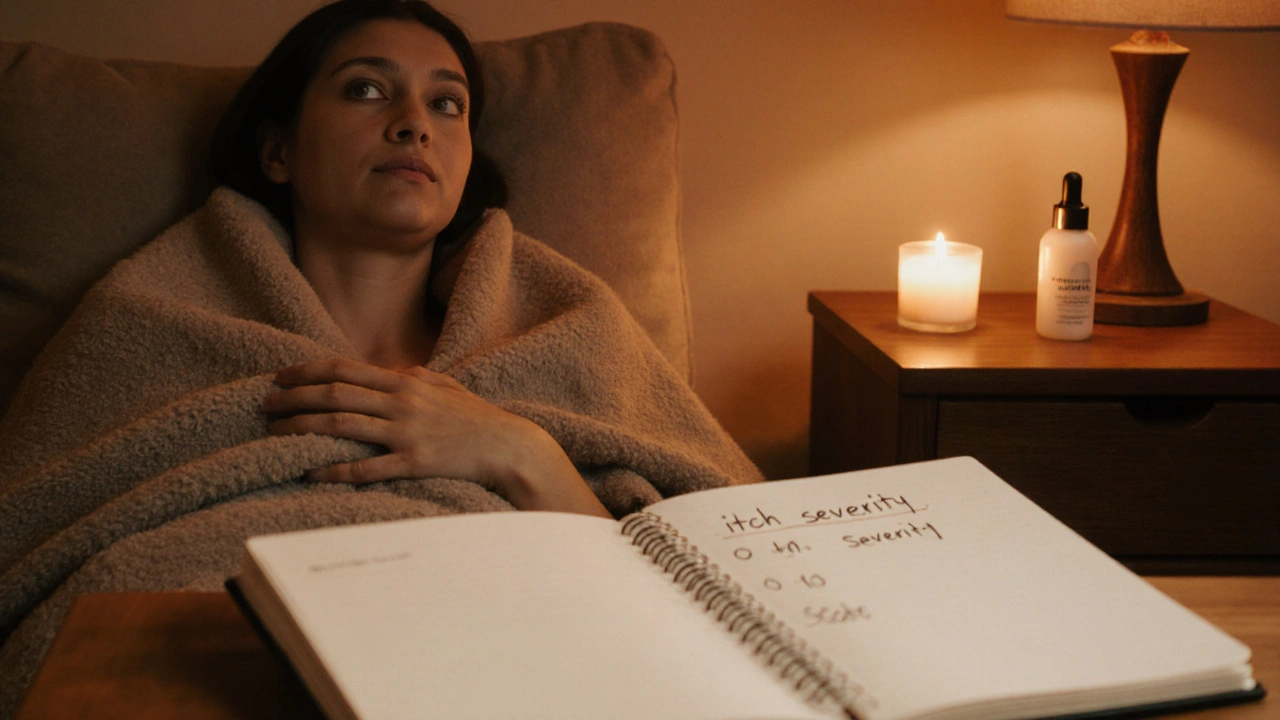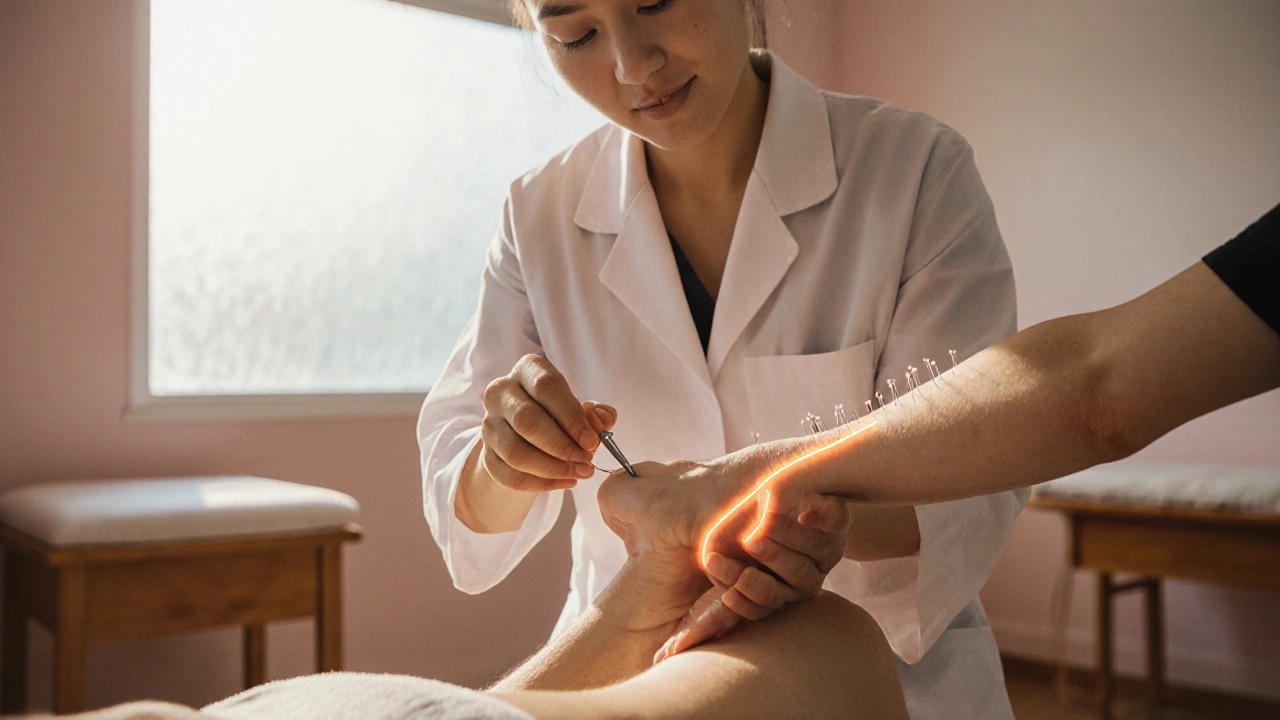Itch Severity Calculator
How Acupuncture Might Help Your Itch
Based on clinical studies, acupuncture can reduce itch severity by 2-3 points on a 10-point scale after 6-8 sessions. This calculator estimates potential improvement based on your current itch level.
Your estimated itch reduction: 0.0 points
After treatment: 5.0 points
Based on clinical evidence showing 2.5-3.5 point reduction after 6-8 sessions
What to Expect
After 6-8 sessions:
Most studies show a 2.5-3.5 point reduction on the 10-point scale.
This means moderate-to-severe itch (7-10) may become mild (3-4).
Key Takeaways
- Acupuncture can reduce chronic skin itching by modulating nerve signals and hormone release.
- Most studies show modest but statistically significant improvement after 6-8 sessions.
- Safety is high when you choose a licensed practitioner and disclose medical history.
- It works best as a complement to, not a replacement for, prescribed medication.
- Expect a short needle insertion, a mild tingling sensation, and a relaxation period of 20-30 minutes.
Persistent itching (pruritus) can ruin sleep, concentration, and mood. While creams and antihistamines help many, a sizable group still suffers side-effects or inadequate relief. acupuncture has risen in popularity as a non-pharmaceutical option, but how does it actually affect itchy skin? This guide breaks down the science, the clinical evidence, and the practical steps you need to decide if needle-based therapy fits your routine.
What is Acupuncture?
Acupuncture is a needle-based therapy that originated in Traditional Chinese Medicine. It aims to restore balance along invisible pathways called meridians, using fine stainless-steel needles inserted at specific points on the body. Modern research suggests the method works by stimulating nerves, releasing endogenous chemicals, and altering blood flow-not by moving mystical energy.
Understanding Skin Itching (Pruritus)
Skin itching (medical term pruritus) is a complex sensation driven by skin cells, immune mediators, and nerve fibers. Histamine, cytokines, and opioid peptides can all trigger the itch receptors in the spinal cord, sending a signal that the brain interprets as an urge to scratch. Chronic itch often persists even after the original trigger (like eczema or liver disease) is treated, because the nervous system becomes sensitized.
Why Acupuncture Might Help
Several biological pathways link acupuncture to itch relief:
- Endorphin release: Inserting needles at points such as LI4 and SP6 stimulates the brain to produce endorphins. These natural opioids dampen the itch signal in the spinal cord.
- Histamine modulation: Studies show acupuncture can lower serum histamine levels, reducing the chemical driver of many allergic itches.
- Neuro-immune balance: By activating the Nervous System through peripheral receptors, acupuncture recalibrates the communication between nerves and immune cells, decreasing hyper-reactivity.
- Improved circulation: Needling improves micro-circulation, helping skin heal faster and reducing dryness that often fuels itching.
Endorphins are natural opioids released by the brain that dampen pain and itch signals. Histamine is an immune molecule that triggers itch receptors when it binds to skin nerves. Acupuncture influences both, raising endorphin levels while lowering circulating histamine, which helps explain the symptom relief.

Clinical Evidence
Clinical studies on acupuncture for pruritus are still emerging, but a handful of randomized trials provide useful data.
- In a 2022 Chinese trial with 120 patients suffering from atopic dermatitis, 8 sessions of acupuncture reduced itch intensity by an average of 3.2 points on a 10-point Visual Analogue Scale, compared with 1.5 points for sham needles.
- A 2023 meta-analysis of six small studies concluded that acupuncture produced a statistically significant improvement in chronic liver-related itch, with a pooled risk ratio of 1.45 for achieving >50% symptom relief.
- Observational data from a UK integrative clinic (2024) reported that 68% of patients with neuropathic itch felt “much better” after a course of 10 sessions, and only 2% experienced mild bruising.
While the numbers are promising, most research notes the need for larger, double-blind trials. The consensus among dermatologists who incorporate complementary approaches is that acupuncture works best as an adjunct rather than a stand-alone cure.
What to Expect in an Acupuncture Session
A typical appointment for itchy skin follows these steps:
- Initial consultation: The practitioner asks about your medical history, itch patterns, current medications, and any contraindications (e.g., bleeding disorders).
- Point selection: Commonly used points include LI4 (Hegu) for pain relief, SP6 (Sanyinjiao) for skin health, and BL40 (Weizhong) for lower back and nerve modulation.
- Needle insertion: Fine needles (0.20-0.25mm) are inserted to a depth of 2-15mm, depending on the point. You may feel a faint tingling, warmth, or “de-qi” sensation.
- Retention: Needles stay for 20-30 minutes. During this time, you can relax, listen to calming music, or practice light breathing.
- Removal and after-care: Needles are withdrawn gently. The practitioner may advise light stretching, moisturising the skin, and avoiding hot showers for a few hours.
Safety and Contraindications
Acupuncture is generally safe when performed by a licensed professional. However, keep these points in mind:
- Do not undergo treatment if you are on blood thinners, have a clotting disorder, or have a pacemaker near the needling site.
- Pregnant women should avoid points that could induce uterine contractions, such as SP6.
- Inform the practitioner about skin infections, eczema flares, or open wounds in the area to be treated.
- Minor side effects-bruising, temporary soreness, or faintness-are usually self-limiting.
Choosing a Qualified Practitioner
When looking for someone to treat skin itching, consider the following checklist:
- Licensed Acupuncturist registration with the UK Acupuncture Council or equivalent body.
- Experience specifically with dermatological conditions or chronic itch.
- Clear communication about treatment plans, expected outcomes, and cost.
- Positive patient testimonials and a clean clinic environment.

Acupuncture vs. Conventional Itch Treatments
| Feature | Acupuncture | Antihistamines |
|---|---|---|
| Primary mechanism | Neuro-immune modulation, endorphin release | Histamine receptor blocking |
| Onset of relief | After 2-4 sessions (gradual) | Within 30 minutes |
| Typical side effects | Minor bruising, temporary soreness | Drowsiness, dry mouth, cardiac effects |
| Suitability for chronic itch | Good when itch is nerve-driven or allergic | Effective for acute allergic reactions |
| Cost per session (UK 2025) | £45-£65 | £5-£15 (over-the-counter) |
Checklist: Starting Acupuncture for Itchy Skin
- Confirm practitioner’s license and dermatology experience.
- Discuss any medications (especially anticoagulants) with both your GP and the acupuncturist.
- Record baseline itch severity using a 0-10 scale.
- Plan a minimum of 6 sessions, spaced one week apart, to gauge effect.
- Track changes in sleep quality, stress levels, and skin condition after each visit.
- Re-evaluate with your dermatologist after the course to decide on continuation.
Frequently Asked Questions
Can acupuncture cure eczema-related itch?
Acupuncture can significantly lower itch intensity and improve skin barrier function, but it is not a cure. It works best alongside moisturisers, topical steroids, or other doctor-prescribed treatments.
How many needles are used for an itch session?
Typically 5-8 points are selected, each with a single needle. The exact number depends on the area of itch and the practitioner’s assessment.
Is acupuncture safe for children with chronic itch?
Pediatric acupuncture is practiced by specialists who use shallower needle depths and gentler techniques. Always verify the practitioner’s pediatric credentials and obtain parental consent.
Will insurance cover acupuncture for itch?
Some private health plans in the UK offer partial reimbursement for acupuncture, especially when prescribed by a GP. Check your policy details or ask the clinic for a referral letter.
What should I do if I feel a flare after a session?
Mild redness or a brief increase in itch can happen as the body adjusts. Apply a fragrance-free moisturizer, avoid hot water, and contact the practitioner if symptoms persist beyond 24 hours.
Next Steps
If you’re ready to try acupuncture, start by researching local UK clinics, book a consultation, and keep a simple itch diary. Remember, the goal is to lower that stubborn itch enough to improve sleep and mood-not necessarily to eliminate it forever.




swapnil gedam, October 12, 2025
I’ve actually tried a few acupuncture sessions for my eczema‑related itch and noticed a subtle change. The needles were barely noticeable after the first half hour, and I felt a gentle warmth spreading across the treated area. Over the course of six sessions my nightly scratching reduced enough that I finally got through a full night’s sleep. The endorphin boost they talk about seems real – I felt calmer, not just less itchy. It’s definitely not a magic bullet, but as a complement to my moisturiser routine it helped keep the flare‑ups in check.
Iain Clarke, October 23, 2025
From a cultural perspective, acupuncture has been part of holistic care for millennia, and modern studies are beginning to validate some of its mechanisms. The needle points LI4 and SP6 are commonly used for skin conditions because they can modulate neuro‑immune pathways. It’s reassuring that most trials report only mild side effects such as transient bruising. If you’re considering it, ensure the practitioner is registered with the relevant UK council. This way you minimise risk while exploring a potentially beneficial adjunct therapy.
Jennifer Harris, November 3, 2025
I was curious about the histamine‑modulating claim, so I looked up a recent meta‑analysis. It indicated a modest reduction in serum histamine after a series of treatments. The numbers aren’t huge, but for chronic itch that’s hard to control any decrease feels worthwhile.
Northern Lass, November 14, 2025
Allow me to articulate, with utmost precision, the epistemological quandaries that permeate the discourse surrounding needle‑based interventions for pruritic maladies. One must first acknowledge the ontological divergence between empirically validated pharmacotherapy and the ostensibly esoteric praxis of meridian manipulation. The corpus of peer‑reviewed literature, albeit nascent, furnishes evidence that acupuncture engenders endogenous opioid release, thereby attenuating nociceptive transmission within the dorsal horn. Moreover, the modulation of histaminergic pathways via specific acupoints, such as LI4 and SP6, conveys a plausible biochemical substrate for itch amelioration. Nevertheless, the methodological rigor of many cited trials remains suspect, often constrained by limited sample sizes and inadequate blinding protocols. Critics contend that the observed therapeutic gains may, in part, be ascribed to placebo phenomena, a contention that warrants meticulous scrutiny. Counterarguments posit that the somatosensory stimulation inherent to needling activates supraspinal descending inhibitory circuits, a hypothesis corroborated by functional neuroimaging studies. It is incumbent upon the discerning clinician to weigh these divergent strands of evidence against the backdrop of patient‑centred care. In practice, acupuncture should be construed not as a monolithic remedy but as an adjunctive modality, synergistic with conventional antihistamines and topical corticosteroids. Furthermore, safety considerations demand meticulous attention to contraindications, including coagulopathies and implantable electronic devices, lest iatrogenic complications ensue. The practitioner’s credentialing, adherence to aseptic technique, and cultural competence constitute additional variables influencing outcomes. In summation, while the preponderance of data intimates a modest yet statistically significant benefit for chronic pruritus, the imperative for large‑scale, double‑blind randomized controlled trials persists. Only through such rigorous inquiry can we transcend conjecture and instantiate evidence‑based integrative dermatology.
Johanna Sinisalo, November 26, 2025
Think of acupuncture as a supportive teammate in your skin‑health journey. It can help lower itch intensity while you continue using moisturisers and any prescribed topical meds. Consistency is key – aim for six to eight weekly sessions and track your itch scores. If you notice improvement, discuss with your dermatologist whether to keep it as a maintenance strategy. Remember, the goal is better quality of life, not a complete cure.
OKORIE JOSEPH, December 7, 2025
Listen up if you think this is some woo‑woo nonsense it does nothing but bruise your skin you waste time and money the needle sticks hurt and you still end up scratching later stop believing hype
Lucy Pittendreigh, December 18, 2025
This sounds like a fad.
surender kumar, December 29, 2025
Oh, great, another mystical remedy for the modern person who can’t sit still. As if putting tiny metal sticks in you will magically silence the itch demons that have been haunting us since puberty. Let’s just hope the needles don’t provoke a flare‑up that’s worse than before.
JOJO Yang, January 9, 2026
Honestly surender you sound like you r reading a script from a 90s infomercial lol. i tried acupuncure once and the only thing i got was a tiny red dot and a snoozeful of relief. maybe it works but not for every incase of itchy.
Faith Leach, January 20, 2026
They’re covering it up! The meds they push are all part of a larger agenda to keep us dependent. If you’re not looking at the hidden micro‑chips in those needles you’re missing the point. Stay vigilant.
Kate Babasa, January 31, 2026
In terms of clinical integration, it’s essential to acknowledge the biopsychosocial paradigm; acupuncture provides a somatic stimulus that can modulate the afferent pathways, thereby influencing both peripheral and central itch circuitry, which, when combined with topical barrier repair agents, may yield synergistic outcomes.
king singh, February 11, 2026
I’ve seen a few patients who added acupuncture to their regimen and reported a slight decrease in nocturnal scratching. It didn’t replace their antihistamines, but it was a helpful adjunct.